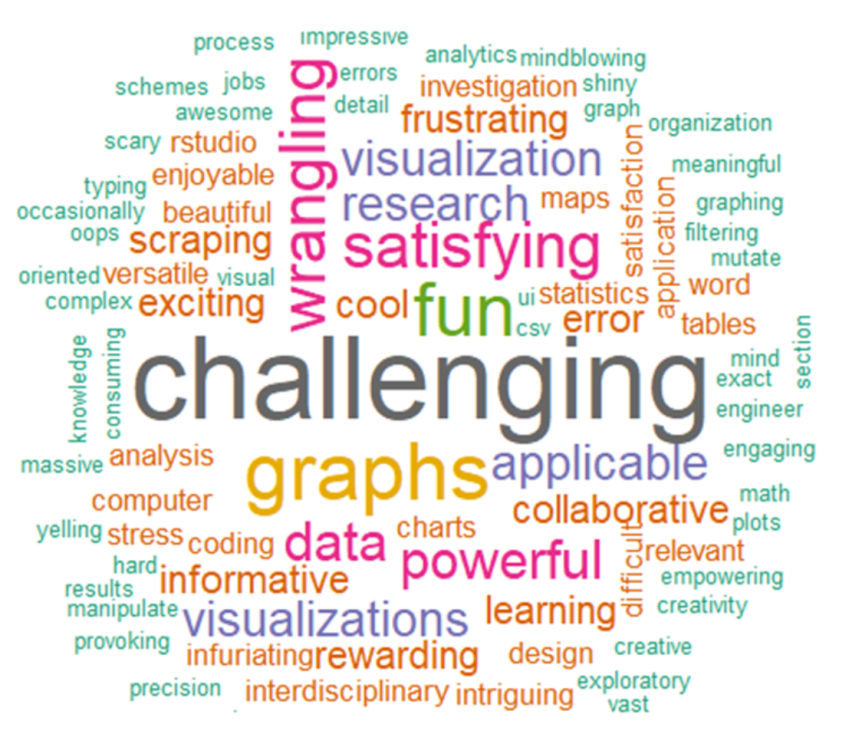Data Science Across The Disciplines: A New Course
| by Caitlin Myers

This winter term five faculty colleagues from Math, Art History, Biology, Economics, and Japanese designed and piloted a new “Data Science Across Disciplines” course blending a traditional introduction to data science with immersive project-based applications across four disciplines on topics ranging from seventeenth-century Dutch art to tick-borne disease to Japanese pop culture to abortion policy.
In the morning, all enrolled students across the four sister sections attended a common lecture—taught by Alex Lyford (Math)—covering the general tools and practices of data science and digital methods. Topics included data acquisition and management, text analysis, visualization, mapping, web scraping, and interactive web applications, all taught in the R software environment. Following the morning lectures, students broke out into one of four afternoon sections—led by Sayaka Abe (Japanese Studies), David Allen (Biology), Caitlin Myers (Economics), or Carrie Anderson (History of Art and Architecture)—to apply the tools they were learning to discipline-specific inquiry.
These project-based learning opportunities afforded students the opportunity to practice and apply their skills by pursuing their curiosity on an academic research project. Students were able to obtain and wrangle real-world messy data in all their complex glory; experience, recognize, and appreciate the ambiguities and art of data analysis; critically engage the decisions we make as data scientists and digital scholars; and practice communication with broad audiences.
In only 4 short weeks students, most of whom had no prior experience in data science or coding, acquired the fundamental skills needed to code and build interactive web applications.
Want to check out their accomplishments? Here are some of their applications:
Interactive Textile Explorer by Ev Berger-Wolf, Camryn Kluetmeier, Jason Rickenbacher, and Nicholas Sliter
Supply Side Abortion Regulations by Prateek Wadhavkar, Xiuyuan Ge, Madeline Elkes, Ayusha Gautam and Constance Gooding
Disney Princesses by Kat Finck, Erika Nakagawa, and Kenta Togo,
Tick Pathogens by Tina Cai, Kevin Ewing, and Anja Jensen
By all metrics—and of course the data science teaching team had metrics!—this course was a tremendous success. Of 58 students, 57 reported that they planned to keep R installed on their computers after the completion of the course and the same number encouraged Middlebury to offer more courses like this in the future. Students commented that they were surprised by “How enthralled I was,” “How fun it could be,” “How obsessed with it I became,” “That I could actually understand computer programming,” and “How easy it is to apply these tools to just about anything.” Students also praised the hands-on, engaged learning approach, commenting that they enjoyed “the intersectionality of the course” and “seeing the broad reach of the tools we learned in the morning and how they can be applied to so many different disciplines.”
Students also highlighted that the challenge was part of the fun: “I enjoyed the atmosphere and energy of the class! The course was challenging, but I felt like there was a place for me to enter the world of data science even though it was completely new to me.” This sentiment was repeated throughout the survey, which perhaps explains how the word “challenge” looms so large in a Word Cloud of responses to “What words come to our students’ minds when they think of “data science”?” (See featured image at the top of this page) and yet is paired with words like “cool,” “fun,” and “rewarding.”
Faculty benefitted from teaching this class too and all five were able to design the course to contribute to their future teaching and scholarship. To learn more, check out the video of a conversation with the faculty who taught the course.

